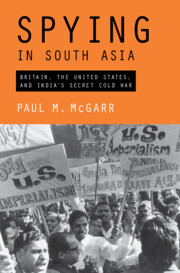Book contents
- Spying in South Asia
- Spying in South Asia
- Copyright page
- Contents
- Figures
- Acknowledgements
- A Note on Place Names
- Abbreviations
- Introduction
- 1 Transfer of Power: British Intelligence and the End of Empire in South Asia
- 2 Silent Partners: Britain, India, and Early Cold War Intelligence Liaison
- 3 India’s Rasputin: V. K. Krishna Menon and the Spectre of Indian Communism
- 4 Quiet Americans: The CIA and the Onset of the Cold War in South Asia
- 5 Confronting China: The Sino-Indian War and Collaborative Covert Action
- 6 Peddling Propaganda: The Information Research Department and India
- 7 From Russia with Love: Dissidents and Defectors in Cold War India
- 8 The Foreign Hand: Indira Gandhi and the Politics of Intelligence
- 9 Battle of the Books: Daniel Patrick Moynihan, Seymour Hersh, and India’s CIA ‘Agents’
- 10 Indian Intelligence and the End of the Cold War
- Conclusion
- Notes
- Bibliography
- Index
1 - Transfer of Power: British Intelligence and the End of Empire in South Asia
Published online by Cambridge University Press: 12 September 2024
- Spying in South Asia
- Spying in South Asia
- Copyright page
- Contents
- Figures
- Acknowledgements
- A Note on Place Names
- Abbreviations
- Introduction
- 1 Transfer of Power: British Intelligence and the End of Empire in South Asia
- 2 Silent Partners: Britain, India, and Early Cold War Intelligence Liaison
- 3 India’s Rasputin: V. K. Krishna Menon and the Spectre of Indian Communism
- 4 Quiet Americans: The CIA and the Onset of the Cold War in South Asia
- 5 Confronting China: The Sino-Indian War and Collaborative Covert Action
- 6 Peddling Propaganda: The Information Research Department and India
- 7 From Russia with Love: Dissidents and Defectors in Cold War India
- 8 The Foreign Hand: Indira Gandhi and the Politics of Intelligence
- 9 Battle of the Books: Daniel Patrick Moynihan, Seymour Hersh, and India’s CIA ‘Agents’
- 10 Indian Intelligence and the End of the Cold War
- Conclusion
- Notes
- Bibliography
- Index
Summary
This chapter considers the process by which an intelligence transfer of power took place in British India. This event ran parallel to, but was conducted in a very different manner and resulted in quite different outcomes from, the political decolonisation of South Asia. The chapter examines plans hatched by the British Security and Secret Intelligence Services to maintain an intelligence foothold in the subcontinent and unpicks how such schemes fostered a bitter and protracted struggle for bureaucratic power and influence between MI5 and MI6. It probes debates held at the highest levels within the British government over whether covert action should be undertaken in independent India, by whom, and to what purpose. It interrogates the efficacy of Indian agency in negotiating the security challenges confronted by an under-resourced post-colonial state, and that counterparts in the West (and the Eastern bloc) saw as a valuable Cold War prize.
Keywords
- Type
- Chapter
- Information
- Spying in South AsiaBritain, the United States, and India's Secret Cold War, pp. 14 - 31Publisher: Cambridge University PressPrint publication year: 2024

